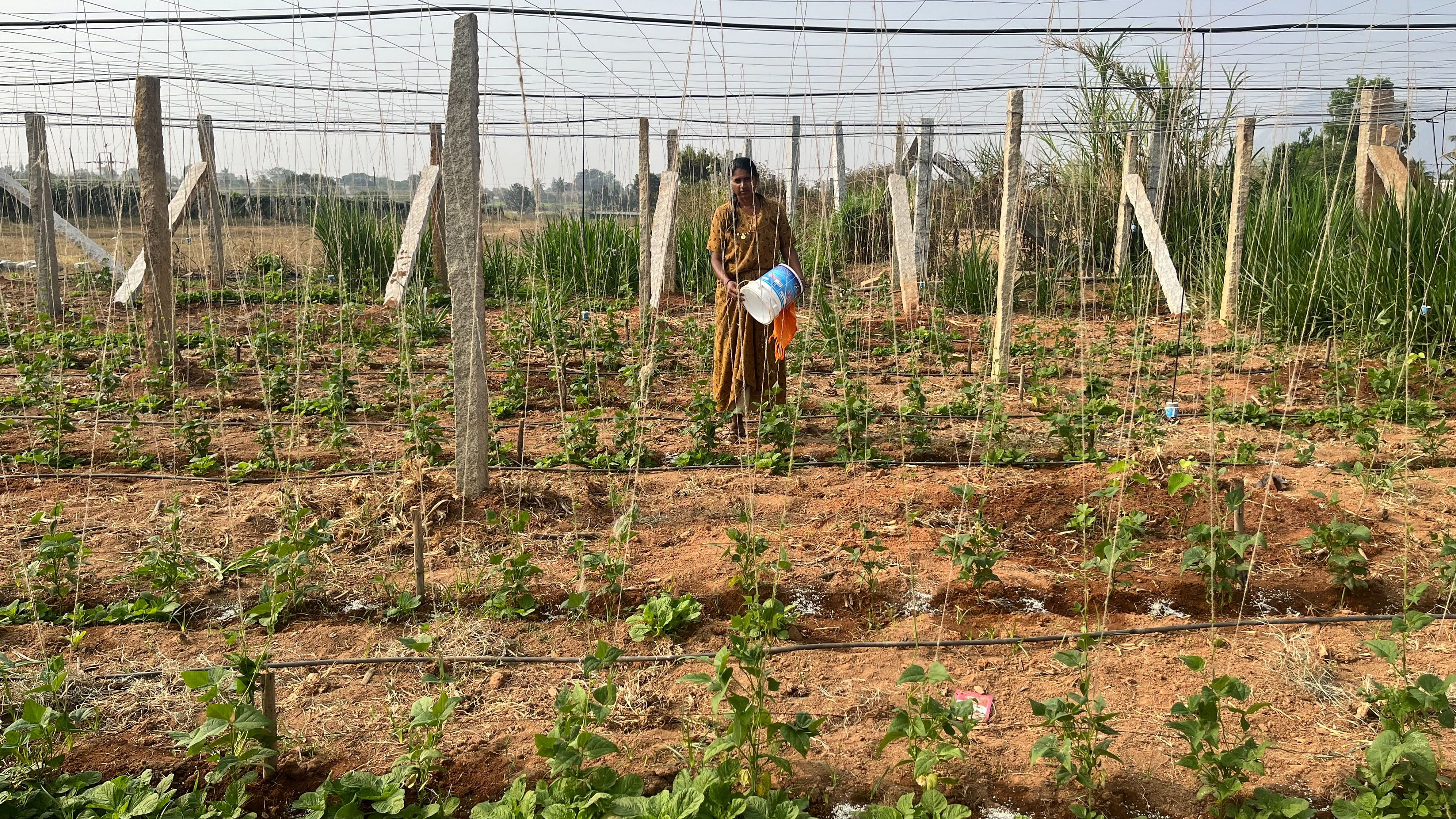
Farmer Shreedevi trying to maintain soil moisture as groundwater levels dip in Chikkaballapur district.
Credit: DH Photo
Chikkaballapur: Just on the periphery of Bengaluru, Chikkaballapur and Kolar districts are major suppliers of vegetables and fruits to the city.
As a water crisis looms, lakhs of borewells in these districts are proving insufficient in providing a reliable water source for agriculture and drinking needs — putting the drinking water security of people in Chikkaballapur and Kolar and supply of vegetables to Bengaluru in jeopardy.
Shreedevi, a farmer on the outskirts of Chikkaballapur town, has used water from 14 borewells in over three decades, not accounting for six failed borewells.
Her family has done all it can to minimise water use, including drip irrigation.
“Right now, only four borewells are functioning. The weather is so dry and soil moisture is very low. I do not know if our crops will survive without irrigation,” she says. The farmer grows a variety of leafy greens and vegetables on her three acres.
“Most vegetables supplied to Bengaluru come from nearby Malur and other taluks in Kolar and Chikkaballapur districts. This is the case because vegetables and fruits are highly perishable. Due to proximity and the massive scale of demand from Bengaluru, these areas have become important,” says Prakash Kammardi, retired professor in the department of agricultural economics at University of Agricultural Sciences and former chairman of Karnataka Agricultural Prices Commission.
Historically, Kolar and Chikkaballapur have depended on groundwater for irrigation.
Shreedevi’s family is among many which rely exclusively on borewells.
Farmer Ramu Shivanna from Kalvamanali village, Kolar district, explains that low groundwater levels have hit water supply to crops. On his five-acre farm, Shivanna cultivates tomatoes and potatoes.
“We provide water through drip irrigation for only two days a week. This delays flowering, causes some plants to wither and output is low,” he says.
A report titled ‘Dynamic Groundwater Resources Assessment of India’ found Kolar categorised as groundwater over-exploited (199%) district, followed by Chikkaballapur (145%) and Bengaluru Rural (137%).
Relying on groundwater for irrigation has proved to be a financial blackhole for farmers.
“Installing one borewell costs nothing less than Rs 3 lakh,” says Lokesh K M, who grows grapefruit in the area. To date, Lokesh has borrowed and saved money to finance 14 borewells.
“Only four are functioning,” he says. The most recent borewell, at 1,480 ft, is the deepest.
Lokesh says, “I can make maybe Rs 10 lakh a year if crop is good, but more than Rs 6 lakh goes into borewell maintenance. How can I afford more and more borewells?” he says.
There was initially some hope when KC Valley and HN Valley projects, which aimed to recharge groundwater by filling lakes with Bengaluru’s treated water, were introduced.
Officials in minor irrigation department claim the rejuvenation of lakes with treated water has been beneficial.
“Groundwater is more available near lakes that received treated water,” says Balasubramanya B, deputy secretary in the department.
Even though lakes have been filled with secondary treated water since then, water availability is questionable.
“Officials have been saying the project is successful, because between 2020 and 2022 there was sufficient rainfall. This was when the project was introduced. Sufficient rainfall was a major reason why water table improved,” says Anjaneya Reddy, a farmer leader in Chikkaballapur.
Shivanna disputes the success of the project. His land lies just next to a KC valley channel. “In the past 5 months, stressed due to lack of water for irrigation, I have invested in installation of 2 borewells. Even though we drilled up to 1,200 ft, both borewells failed,” he says.
In Shreedevi’s case, only 500 to 600 gallons of water was available for use, says Ramesh, her husband.
“Only the most recent borewell installed two years ago yielded 1,000 gallons of water. That was when there was enough rain,” he adds.
When the motors are turned on these days, water flow is low, the couple said.
“We do not know how long water will last in these borewells. We do not know if we will get more water on digging more borewells,” says Shreedevi.
“Our water is used to grow vegetables, rear cattle and chicken for milk and meat. All of this goes to Bengaluru. How will the city fare if we don’t have water?” he says.